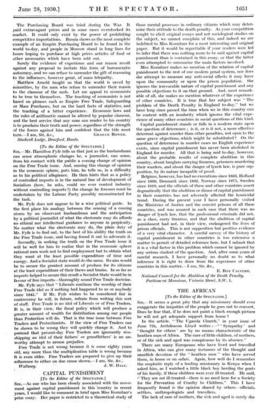• CAPITAL PUNISHMENT
[To the Editor of the SPECTATOR.]
Sin,—As one who has been closely associated with the move- ment against capital punishment in this 'country in recent years, I would like to comment in brief upon Miss Komitzer's prize essay4 Her paper is restricted to a -theoretical study of those mental processes in ordinary citizens which may deter- mine their attitude to the death penalty. As your competition sought to elicit Original essays and not sociological studies on the subject, we cannot complain of this, and indeed we are indebted to Miss Kornitzer for a most interesting and original paper. But it would be regrettable if your readers were led to infer that there was nothing more to be said against capital punishment than is contained in this essay, or that the latter even attempted to summarize the main factors involved.
Miss Kornitzer makes no mention of the relation of capital punishment to the rest of our modem penal system, nor does she attempt to measure any anti-social effects it may have upon the community or upon the prison population. She ignores the irrevocable nature of capital punishment and any possible objections to it on-that ground. And, most remark- able of all, she makes no mention whatever of the experience of .other countries. It is true that her subject was "The prolgern of the Death Penalty in England to-day," but we have long since passed the time when we in this country can be content with an insularity which ignores the vital expe- rience of many other countries in social questions of this kind.
Capital punishment stands or falls in a modern state upon the question of deterrence ; is it, or is it not, a more effective deterrent against murder than other penalties, not open to the same grave objections, which might be substituted? On the question of deterrence in murder cases no English experience exists, since capital punishment has never been abolished in England for murder. All that is being said to-day, however, about the probable results of complete abolition in this country, about burglars carrying firearms, prisoners murdering their warders, and about the danger of lynch law, is pure sup- position, by its nature incapable of proof.
Belgium, however, has had no executions since 1863, Holland since 1860, Denmark since 1892, Norway since 1875, Sweden since 1910, and the officials of these and other countries assert dogmatically that the abolition or disuse of capital punishment in their countries has not adversely affected the homicidal trend. During the present year I have personally visited the Ministries of Justice and the convict prisons of all these countries, and was assured in each case that there was no danger of lynch law, that the professional criminals did not, as a class, carry firearms, and that the abolition of capital punishment had not, in their view, endangered the lives of prison officials. This is not supposition but positive evidence of a very vital character. A careful survey of the history of capital punishment in other. countries is too extensive a matter to permit of detailed reference .here, but I submit that it is a vital factor in this problem which cannot be ignored by any serious student of the question. And, after some years of careful research, I have personally no doubt as to what inference it is right to draw from the experience of other countries in this matter.—I am, Sir, &c.,
E. ROY CALVERT. Natiotud Council for the Abolition of the Death Penalty, Parlianmit Mansions, Victoria Street, S. W. 1.


















































 Previous page
Previous page